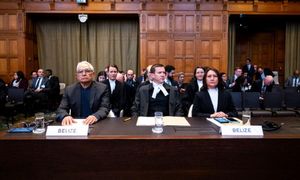The Australian Prime Minister Anthony Albanese faces growing scrutiny over his handling of information concerning a significant terrorist threat against the Jewish community, as details of the incident continue to emerge. The crisis began when New South Wales (NSW) police discovered a caravan loaded with explosives, enough to create a blast radius of 40 meters, on January 19, 2025. Notably, the caravan was thought to be part of a larger antisemitic plot, which included notes identifying key Jewish sites such as the Great Synagogue and the Jewish Museum in Sydney.
Despite the severity of the situation, it has come to light through reports from the Daily Telegraph and other outlets, including updates from various government officials, including NSW Premier Chris Minns, who was informed shortly after the findings were made, raising questions about why Prime Minister Albanese was kept out of the loop.
Albanese has not disclosed when he was briefed about the discovery, asserting instead, "What's the correct protocol is making sure we don't speak about operational matters…I have no intention of undermining the investigation by going to the details." This statement was met with increasing frustration among opposition parties who highlighted the Prime Minister's seeming unawareness of such national security threats.
Opposition Leader Peter Dutton criticized Albanese’s handling of the situation, stating, "The Prime Minister should have been one of the first informed about this terrorism threat, especially against the backdrop of rising antisemitism." Dutton questioned the lack of communication, noting how unusual it was for any Prime Minister to remain uninformed about something of this magnitude. He urged the government to take the antisemitism crisis seriously, emphasizing the need for transparency and timely communication among security agencies.
Meanwhile, Albanese's government has been previously criticized for its response to the rising tide of antisemitism across Australia, especially following recent violent incidents targeting Jewish individuals and institutions. Such incidents have intensified fears within Australia’s estimated 115,000-strong Jewish community, and the Prime Minister’s leadership and ability to address these concerns have come under fire. Recent attacks reportedly include graffiti on Jewish properties and firebombings like the one at the Adass Israel Synagogue.
NSW police confirmed their investigation has drawn on more than 100 officers, and several arrests took place over alleged antisemitic incidents. They have indicated serious concern about what they categorize as domestic terrorism aimed at the Jewish community. "This is undeniably an escalation of race-filled hatred and potential violence," said NSW Premier Chris Minns.
Labour MP Josh Burns has called for collective responsibility to tackle antisemitism, stating, "We cannot only legislate and arrest our way out of this." He urged the need for education and awareness, reflecting on his experiences as part of the Jewish community. This sentiment echoed during discussions held at community centers, where members expressed fears over safety and security amid the uptick of hate crimes.
Following the revelations, the Australian Electoral Commission (AEC) raised its concerns about the potential impact of the deteriorated social cohesion on the forthcoming federal elections, hinting at possible security measures at polling places to protect citizens.
On the other hand, Albanese has attempted to shift focus back on to measures his government is ensuring to support the police and intelligence operations. He asserts the necessity of thorough investigations and the importance of not releasing sensitive information during operational phases.
The discourse surrounding this incident reflects broader national debates on community safety, the rise of antisemitism, and the government’s approach to combating terrorism. Critics continue to call for more action to not only prevent attacks but also to bridge communication breakdowns between police and government leaders.
Many hope this series of events may prompt both the government and opposition to unify their efforts to contact and secure the safety of communities affected by heightened hostility and discrimination. Security analysts express the concern over why certain information was restricted, questioning whether it was due to potential leaks within ranks, operational protocols, or simply mismanagement.
Understandably, the reactions to this situation not only affect the political atmosphere but have broader consequences potentially impacting relationships within communities nationwide. Observers are closely monitoring how the Albanese government will respond to the backlash, will they recalibrate their strategies, and address concerns of public safety effectively, especially as the nation continues to grapple with the rising tide of hate and violence.
With the federal elections looming and antisemitism shaping up to be pivotal discourse, all eyes are focused on how leaders will navigate through this complex crisis, aiming for both accountability and safety in the face of terror.



